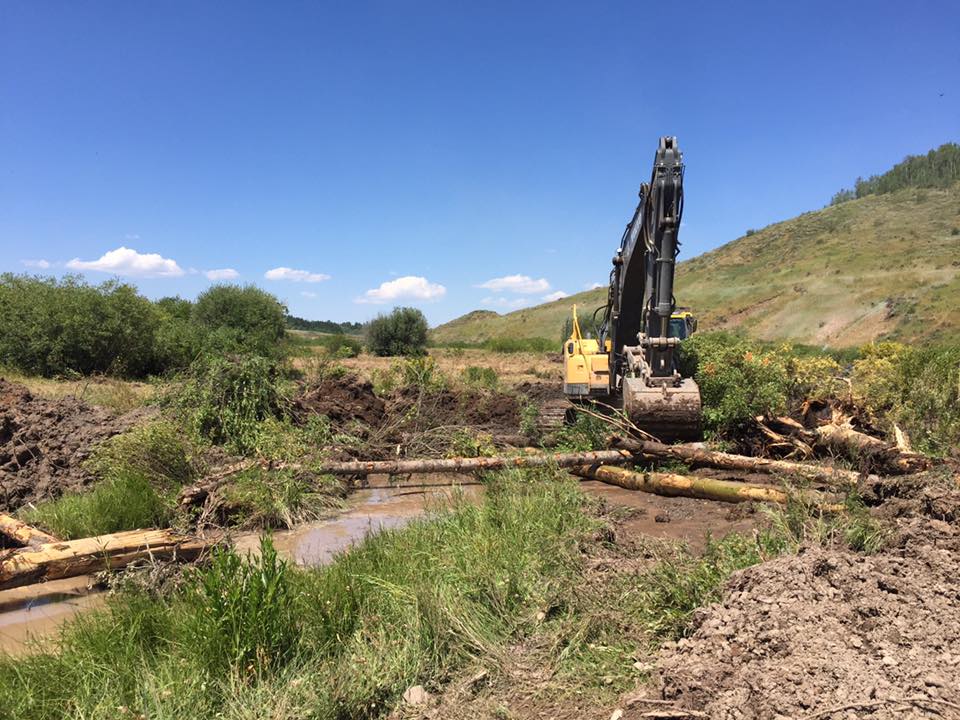Monday, July 17, 2017
Contacts:
Leslie Steen, Snake River Headwaters Project Manager, Trout Unlimited, 307-699-1022, lsteen@tu.org
Lee Mabey, Forest Fisheries Biologist, Caribou-Targhee National Forest, 208-557-5784, lmabey@fs.fed.us
TROUT UNLIMITED AND CARIBOU-TARGHEE NATIONAL FOREST PARTNER TO RESTORE TINCUP CREEK FOR NATIVE FISH
JACKSON, Wyoming – Trout Unlimited (TU) and the Caribou-Targhee National Forest (CTNF) announced today the launch of the Tincup Creek Stream Restoration Project. The project is a large-scale, multi-phased project to improve ecosystem function and habitat for cutthroat trout and other native fish species by restoring channel and floodplain function and processes on 4 miles of degraded stream on CTNF lands. Implementation of the project’s first phase will occur between July 15th and September 30th, 2017 and last approximately 5 weeks, with future phases anticipated in 2018 or 2019.
The Tincup Creek project area is located above the junction of Highway 34 (Tincup Highway) and USFS Road #117 (Tincup / Bridge Creek Road), between Wayan, Idaho, and Freedom, Wyoming, in southeast Idaho. Tincup Creek within the project area has been impaired and degraded for more than 60 years, with the primary cause of the degradation linked to aerial spraying of willows in 1956. The loss of willows precipitated the destabilization of the stream and led to the loss of meander bends and stream length, steepened gradients, channel downcutting, and an unhealthy, disconnected floodplain and riparian zone.
The project will improve riparian conditions and habitat for Yellowstone cutthroat trout (Snake River cutthroat trout subspecies), northern leatherside chub, boreal toad, western pearl shell mussels and bluehead suckers, which are all native species with special management emphasis. Pre-project fish monitoring documented low densities of primarily adult trout, indicating poor habitat complexity for juvenile trout and smaller native fishes such as northern leatherside chubs.
“It’s exciting to be restoring an area where we know what past activities led to its decline. To make large changes that benefit an area takes many willing partners, it’s been gratifying to see all the partners that have joined together to make a difference in this very unique system as evidenced by all the native species that exist here,” said Lee Mabey, Forest Fisheries Biologist for the Caribou-Targhee National Forest.
The project’s goals are to restore stream processes and function to allow for all parts of the aquatic system to interact with each other. Restoration techniques will include building floodplain benches, transplanting whole willows, reconnecting historic meanders, adding large woody debris, elevating riffles for floodplain reconnection, and reinforcing naturally-occurring beaver dams. These techniques will be carried out by heavy equipment operators experienced in stream restoration work, with Phase 1 of the project (encompassing approximately 2 miles or half of the full project area) expected to begin the week of July 17th, 2017. In addition, volunteers from local TU chapters based in Idaho Falls, Star Valley, and Jackson Hole will assist in components of the restoration effort in the fall.
Phase 1 of the Tincup Creek Stream Restoration Project was funded by the US Forest Service, Desert Fishes Habitat Partnership, Jackson Hole Trout Unlimited, Jackson Hole One Fly, Snake River Cutthroats TU, US Fish and Wildlife Service, and the Western Native Trout Initiative. Additional in-kind support was provided by Agrium, Bear Lakes Grazing Association, Idaho Department of Fish and Game, grazing permittees and Caribou County.
“We are looking forward to seeing the native fisheries in Tincup Creek rebound as a result of this partnership effort to restore the stream. We’re grateful to all the partners that have made this work possible,” said Leslie Steen, TU Snake River Headwaters Project Manager.
The Tincup Creek Stream Restoration Project is a project of TU’s Snake River Headwaters Home Rivers Initiative, an ambitious initiative to restore and protect the headwaters of the upper Snake River and its fishery, together with a diverse group of community, landowner, and agency partners.
Visit TU’s Snake River Headwaters Initiative microsite for more information and project photos.
About Trout Unlimited
Today, Trout Unlimited is a national organization with more than 155,000 volunteers organized into 400 chapters nationwide. These dedicated volunteers are paired with a respected staff of organizers, lawyers, policy experts and scientists, who work out of more than 30 offices. Our mission is to conserve, protect and restore North America’s cold-water fisheries and their watersheds. Follow TU on Facebook and Twitter, and follow our blog for all the latest information on trout and salmon conservation.
About the Caribou-Targhee National Forest
The Forest Service was originally organized to provide healthy watersheds and clean water. Forest Service lands are to be managed to provide the greatest good to the greatest numbers as we care for the land and serve the people.



